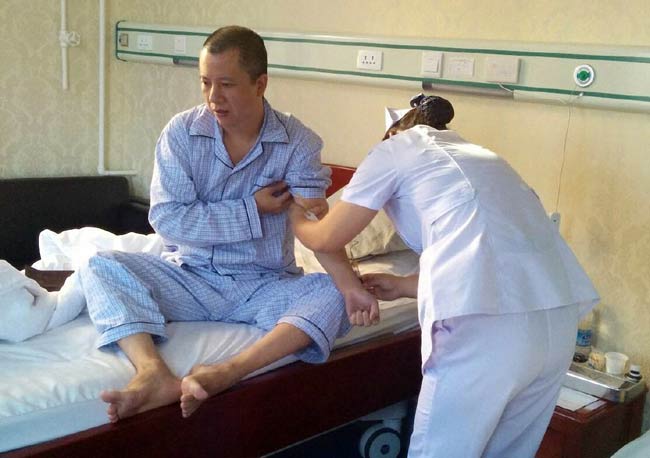 |
|
Nian Bin, who was acquitted and released on Aug 22 after being wrongly convicted four times, receives treatment at a Beijing hospital earlier this month.PROVIDED TO CHINA DAILY |
Why did Nian Bin receive just 1.13 million yuan in compensation when he asked for more than 15 million yuan? The reason is that the scope for compensation as regulated by the nation’s compensation law was too narrow, and not because the court was being too stingy. The court that first delivered the guilty verdict gave Nian a capital penalty three times, while an intermediate court declared his innocence. Nian was put behind bars for a total of 2,936 days. But under the country’s compensation law, the Fuzhou Intermediate People’s Court paid Nian only 1.139 million yuan for the loss of his freedom and the mental distress it caused him.
The deteriorating health, delayed treatment for health conditions, and damage to reputation suffered by the wrongly convicted should be compensated by the State. The country should also pay for the traffic, accommodation and legal fees generated during the course of victims’ efforts to have the wrong redressed. For the people who lost the ability to work after being wrongfully convicted, the country should consider some form of reparation to help them return to society.
The narrow scope and insufficient amounts of compensation regulated in the nation’s compensation law lead to injustice. If the wrongfully convicted has been placed behind bars, the authorities usually calculate the compensation money based on the average daily wage of all of the country’s workers in the past year. However, this does not adequately compensate those who were private entrepreneurs and business owners. The State compensation should cover the losses of a business’ regular operation and potential profit when its owner has wrongfully served terms in prison or detention.
Furthermore, the nation’s compensation scheme does not support damages in health and delayed medical treatment caused by the restriction on one’s freedom. People can only get the reparation when their life or health is greatly harmed by the nation, namely if physical injuries were sustained, if the person loses partial or total ability to work, or in the case of death. This is also unreasonable. In addition to the loss to health and delayed medical treatment, and the transportation, accommodation and legal fees generated during the process to get the wrong corrected, the country should also pay for the mental distress caused to the victims’ loved ones.
The nation’s compensation law also only requires an apology and the restoration of reputation when the rights-infringing acts cause mental impairment to the victims. Only when the impairment causes severe consequences can a victim get monetary reparation. As a matter of fact, being wrongfully convicted or arrested, whether or not there is any mental impairment, will immediately cause other members of society to regard the victim negatively. It is a violation of the victim’s honor, a tremendous loss in reputation and social standing that is impossible to repair. The rights of reputation and honor, both enshrined in the nation’s laws, are definitely casualties of wrongful incarceration. Therefore, the harm to the reputation and honor of the victim must not be ignored when the country decides on State compensation.
Another flaw in the compensation law is that it neglects the cost to victims of returning to normal life. The nation is obligated to help them return to society as soon as possible, and gain some skills to make a living. The nation should well consider paying for the learning, training and employment when helping such victims return to society, and it is obliged to do so.
Power comes with responsibility. Power will only be used more carefully when power equates responsibility. The abuse of the power can lead to severe damage to a citizen’s life, health, freedom and property rights. The case of Hugjiltu, a teenager who was wrongfully convicted and executed, serves as a warning to State workers with power that money cannot buy back a life. Those responsible for the wrongful convictions must pay a corresponding price in State compensation.
Written by Zhu Lieyu, a national legislator and director of Guangdong Guardian Law Firm
Translated by Wang Zhenghua
Related Stories